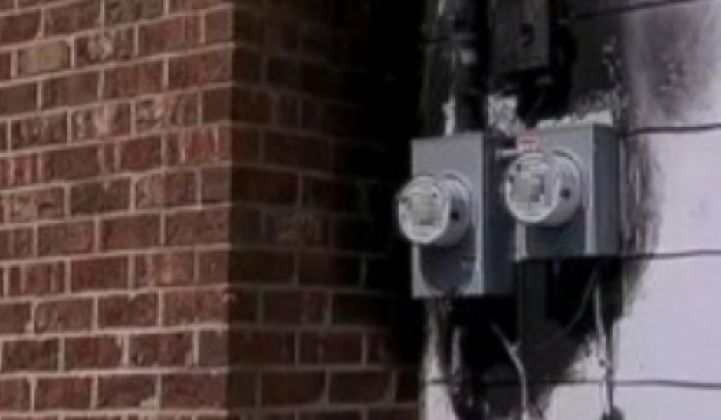Smart meter vendor Sensus has had bad luck when it comes to having a handful of its smart meters -- or something connected to or nearby those smart meters -- catching on fire. And even an all-clear from Underwriters Laboratories hasn't been enough for Sensus to win some of its utility customers back -- at least not yet.
That’s the news from Canada’s Saskatchewan province, where Sensus won a small victory this week with the municipal utility of Medicine Hat. The 31,483-customer utility announced last week that it’s going to keep installing the rest of its Sensus Gen 3 iConA electric meters, after a series of UL tests showed they met all safety standards.
That’s a lower-cost alternative than the one Sensus faces with much larger utility SaskPower, which in August decided to pull 105,000 of the same meters after eight reports of fires. SaskPower got its own UL test results in December, showing the Sensus meters passed all safety tests under the UL 2735 Standard for Safety for Electric Utility Meters, which test resistance to flame, water, temperature swings and exposure to various voltages and other extreme operating conditions.
Even so, SaskPower is still asking Sensus to spend about $5 million to develop a new smart meter that meets more stringent safety standards -- although just how they’ll differ from UL’s standards, the utility has yet to say.
“The results are encouraging in the sense that we now have independent confirmation that these meters meet all standards,” Mike Marsh, SaskPower acting president and CEO, said in a December statement. “That being said, the way these meters failed in the Saskatchewan environment was unacceptable. It’s clear that the bar must be raised. Higher standards are required of a new meter, and SaskPower is leading the charge on exactly that front.”
Consider it an example of how a few bad smart meter events can trigger a much more damaging consumer and political backlash. Smart meters are already under attack from customers on grounds ranging from health risks to privacy concerns.
Fires, of course, are a much more pressing issue than these as-yet-unproven dangers. But tests conducted by Sensus indicated that the eight fires were caused by “longstanding industry issues: one was caused by an issue with a meter base attached to a home, three were caused by utility overvoltage, two were caused by water intrusion through the meter base, and one remains under investigation.” The UL tests appear to confirm that Sensus’ product wasn’t to blame.
Even so, the solution that Sensus has reached with SaskPower will at least allow it to keep the utility as a customer. That’s better than the outcome with Pennsylvania-based utility PECO, which halted installation of Sensus meters in 2012 after reports of about two dozen fires. PECO’s investigation did not find that Sensus’ technology was at fault. Still, PECO replaced Sensus with Landis+Gyr meters for rest of its rollout.
Sensus isn’t the only smart meter vendor that’s dealing with the issue of fires. Canadian utility BC Hydro, which uses Itron smart meters, came under scrutiny after a few meter fires were reported in its territory in 2012. California utility Pacific Gas & Electric, which uses General Electric and Landis+Gyr meters, was spotlighted after an electrical short in a Santa Rosa shopping mall caused three smart meters to “melt down,” and electrical malfunctions have caused reported smart meter fires for Florida utility FPL, which uses GE meters.
Even so, Sensus seems to have gotten the worst of the issue, in terms of being forced to replace meters due to fire concerns. It saw 10,500 meters replaced by Lakeland, Fla.'s municipal utility after six reported meter fires, and Oregon utility Portland General Electric replaced 70,000 meters after three reports of fires last year.



